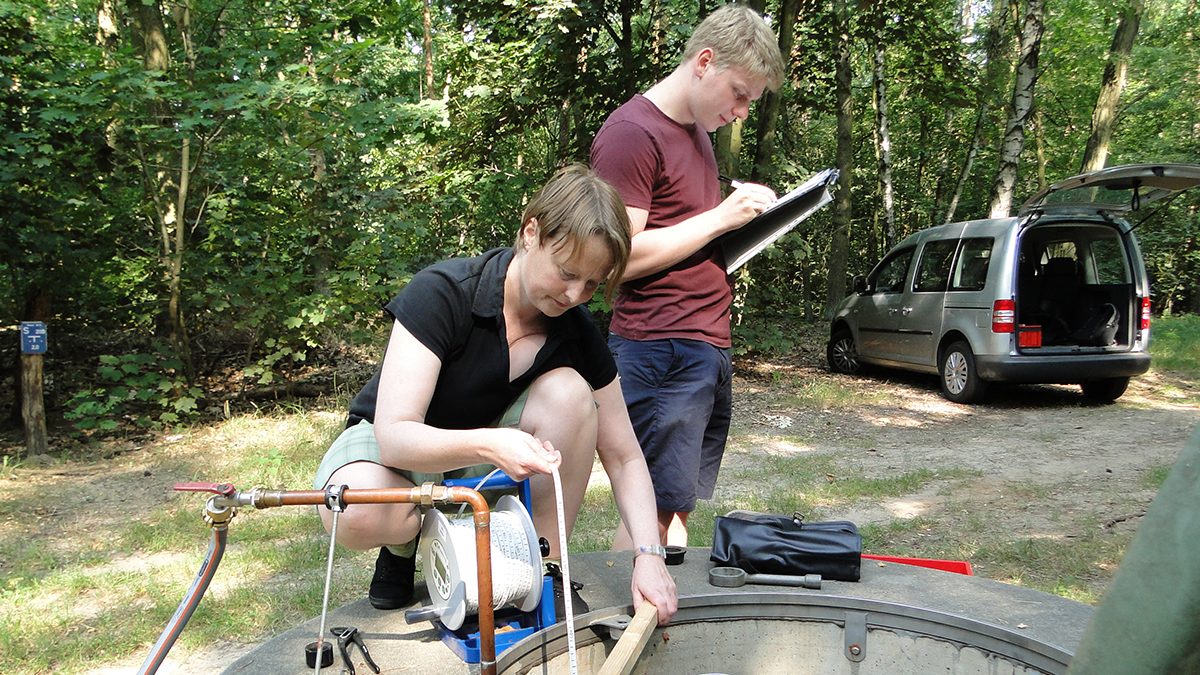
The summer 2020 was the second hottest since records began in 1881 and particularly the northeast of Germany with less than 500 litres of annual precipitation per square meter was much too dry, also in Berlin. This has serious consequences on natural groundwater reserves. KWB is concentrating its research efforts on finding strategies to deal with climate change impacts.
Nearly 100% of the drinking water in Berlin comes from the groundwater resources within the city limits. Roughly 60% of it is generated by bank filtration, 10% by managed aquifer recharge and around 30% by natural replenishment. This means that via bank filtration and managed aquifer recharge the drinking water supply is indirectly covered to a large extent from surface water. Managed aquifer recharge aims at stabilising groundwater availability, ensuring security of supply at peak loads, providing water of perfect quality and protecting groundwater-dependent ecosystems.
Consequently, Berlin’s drinking water supply is, besides its groundwater resources, particularly affected by quantitative and qualitative changes in the surface waters of the rivers Havel, Spree and Dahme. Climate change scenarios for the Berlin-Brandenburg region foresee hotter, drier summers and more heavy rain events and thus the flow of the Spree and Havel river will decrease. At the same time, water demand is rising. Even if groundwater recharge mainly takes place in the winter months, most climate projections indicate reduced annual groundwater recharge rates. In addition, the impact of heavy rainfalls on groundwater is still insufficiently understood so that it is difficult to obtain reliable forecasts of future groundwater recharge.
The climatic water balance of Berlin is already negative in dry years. According to current projections, this trend will intensify in the future. As a result, the competition for the use of water resources will equally increase.
Diminishing groundwater availability and falling water levels in rivers are problematic aspects in terms of quantity and quality of drinking water supply. Corresponding changes must therefore be recognised as early as possible followed by the analysis of suitable control options in order to ensure safe drinking water supply in the metropolitan region.Against this background, KWB is testing methods for risk analysis and real-time monitoring systems.
Replenishment rather in winter
In the HYDRA project (hydraulics and colmation processes in artificial groundwater recharge in Berlin under changing climatic conditions, 2018-2020), meteorological, hydrogeological and operational data on drinking water extraction were correlated. Based on these data, scenarios for future peak loads in drinking water abstraction, reduced natural groundwater recharge and managed aquifer recharge as an operational measure were developed and subsequently simulated by numerical groundwater models. It could be demonstrated that, even with expected peak loads, the predicted decline in groundwater recharge and a slight increase in water demand can theoretically be compensated for by additional groundwater recharge. In order to ensure drinking water supply even in the dry summer months with low water levels in the rivers, it was recommended that the water abstraction for managed aquifer recharge should be rather carried out during the winter months. This way, the aquifer’s storage function could be used to bridge short-term low water levels in the rivers.

Microbiological risk assessment
Managed aquifer recharge schemes rely on the high removal of chemical and biological contaminants during the underground passage. These removal processes are often time-dependent (e.g. biodegradation, inactivation), and understanding hydraulic residence times, from the infiltration basin or river to the extraction wells, is a key element in managing groundwater recharge.
In the international research project SMART-Control (New monitoring and control methods for MAR processes) scientists from KWB and other institutions are developing online monitoring and control systems to observe the hydraulic residence times. The recently installed scheme is based on real time sensor data and evaluation algorithms, which are implemented in a web platform. The water level and water temperature are measured in the infiltration basins, at selected control points and in drinking water wells. Particularly the temperature curves are suitable to simply and inexpensively quantify the residence time of the water between the infiltration basin and the well.
In addition, a microbiological risk assessment is implemented in a web-based environment. By means of the removal performance of microorganisms depending on the residence time, this tool allows for the quantification of the health risk related to water extraction. This is the basis for targeted modifications of the operation mode of the infiltration basins and wells to ensure that the water remains in the underground passage for a sufficiently long time.
Delving into groundwater
Making groundwater visible as an essential part of the urban water cycle is a key objective of the EU Horizon2020 project digital-water.city (DWC, 2019-2022). KWB’s groundwater team, together with Berliner Wasserbetriebe and the IT start-up Vragments, is developing and processing a dedicated digital solution of DWC: An augmented reality mobile application will visualise the background and context of geology and groundwater and highlight the great relevance of the “hidden part of the water cycle”.
The application is supposed to enable its users to virtually dive into groundwater and learn about geology and groundwater issues. The tool visualizes the different geological layers and explains their role in drinking water supply.With the example of two Berlin water works, water production by means of bank filtration and managed aquifer recharge is demonstrated. The users learn about drinking water contents, aquifers and the parameters influencing water transport during the underground passage. The application is intended to be used for various communication purposes (tourism, environmental education, conflict management, discussions with environmental authorities, etc.). A first prototype is currently being tested.
With these and other projects plus new research initiatives, KWB contributes to the sustainable use of water resources under changing climatic conditions and helps to avert an impending water crisis.
Authors: Hella Schwarzmüller, Head of Department “Groundwater” at Kompetenzzentrum Wasser Berlin and Christoph Sprenger, Researcher at Kompetenzzentrum Wasser Berlin
Block error: "Call to a member function resize() on null" in block type: "references"

